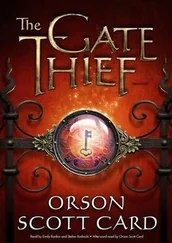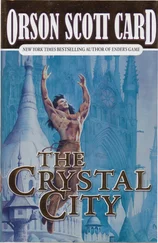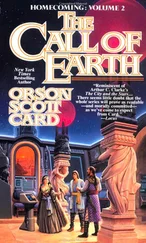Orson Card - The Memory of Earth
Здесь есть возможность читать онлайн «Orson Card - The Memory of Earth» весь текст электронной книги совершенно бесплатно (целиком полную версию без сокращений). В некоторых случаях можно слушать аудио, скачать через торрент в формате fb2 и присутствует краткое содержание. Жанр: Фантастика и фэнтези, на английском языке. Описание произведения, (предисловие) а так же отзывы посетителей доступны на портале библиотеки ЛибКат.
- Название:The Memory of Earth
- Автор:
- Жанр:
- Год:неизвестен
- ISBN:нет данных
- Рейтинг книги:5 / 5. Голосов: 1
-
Избранное:Добавить в избранное
- Отзывы:
-
Ваша оценка:
- 100
- 1
- 2
- 3
- 4
- 5
The Memory of Earth: краткое содержание, описание и аннотация
Предлагаем к чтению аннотацию, описание, краткое содержание или предисловие (зависит от того, что написал сам автор книги «The Memory of Earth»). Если вы не нашли необходимую информацию о книге — напишите в комментариях, мы постараемся отыскать её.
The Memory of Earth — читать онлайн бесплатно полную книгу (весь текст) целиком
Ниже представлен текст книги, разбитый по страницам. Система сохранения места последней прочитанной страницы, позволяет с удобством читать онлайн бесплатно книгу «The Memory of Earth», без необходимости каждый раз заново искать на чём Вы остановились. Поставьте закладку, и сможете в любой момент перейти на страницу, на которой закончили чтение.
Интервал:
Закладка:
"Look, I didn't say anything, I just came in here, and you started picking at me the second I walked in the door."
"I was hoping you'd walk back out."
"I can't. Mother sent me here." Nafai walked over behind Issib, who was floating comfortably in the air in front of his computer display. It was layered about thirty pages deep, but each page had only a few words on it, so he could see almost everything at once. Like a game of solitaire, in which Issib was simply moving fragments from place to place.
The fragments were all words in weird languages. The ones Nafai recognized were very old.
"What language is th a t ?" Nafai asked, pointing to one.
Issib sighed. "I'm so glad you're not interrupting me."
"What is it, some ancient form of Vijati?"
"Very good. It's Slucajan, which came from Obilazati, the original form of Vijati. It's dead now."
"I read Vijati, you know."
" I don't,"
"Oh, so you're specializing in ancient, obscure languages that nobody speaks anymore, including you?"
"I'm not learning these languages, I'm researching lost words."
"If the whole language is dead, then all the words are lost."
"Words that used to have meanings, but that died out or survived only in idiomatic expressions. Like ‘dancing bear.' What's a bear^ do you know?"
"I don't know. I always thought it was some kind of graceful bird."
"Wrong. It's an ancient mammal. Known only on Earth, I think, and not brought here. Or it died out soon. It was bigger than a man, very powerful. A predator."
"And it danced ?"
"The expression used to mean something absurdly clumsy. Like a dog walking on its hind legs."
"And now it means the opposite. That's weird. How could it change?"
"Because there aren't any bears. The meaning used to be obvious, because everybody knew what a bear was and how clumsy it would look, dancing. But when the bears were gone, the meaning could go anywhere. Now we use it for a person who's extremely deft in getting out of an embarrassing social situation. It's the only case where we use the word bear anymore. And you see a lot of people misspelling it, too."
"Great stuff. You doing a linguistics project?"
"No."
"What's this for, then?"
"Me."
"Just collecting old idioms."
"Lost words."
"Like bear? The word isn't lost, Issya. It's the bears that are gone."
"Very good, Nyef. You get full credit for the assignment. Go away now."
"You're not researching lost words. You're researching words that have lost their meanings because the thing they refer to doesn't exist anymore."
Issya slowly turned his head to look at Nafai. "You mean that you've actually developed a brain?"
Nafai pointed at the screen. "Kolesnisha. That's a word in Kunic. You've got the meaning right there - war wagon. Kunic hasn't been spoken in ten million years. It's just a written language now. And yet they had a word for war wagon. Which was only just invented. Which means that there used to be war wagons a long time ago."
Issib laughed. A low chuckle, but it went on and on.
"What, am I wrong?"
"It just kills me, that's all. How obvious it is. Even you can just walk up to a computer display and see the whole thing at once. So why hasn't anybody noticed this before? Why hasn't anybody noticed the fact that we had the word wagon already, and we all knew what it meant, and yet as far as we know there have never been any wagons anywhere in the world ever?
"That's really weird, isn't it?"
"It isn't weird, it's scary. Look at what the Wetheads are doing with their war wagons - their kolesnishety. It gives them a vital advantage in war. They're building a real empire, not just a system of alliances, but actual control over nations that are six days' travel, away from their city. Now, if war wagons can do that, and people used to have them millions of years ago, how did we ever forget what they were? "
Nafai thought about that for a while. "You'd have to be really stupid," he said. "I mean, people don't forget things like that. Even if you had peace for a thousand years, you'd still have pictures in the library."
"No pictures of war wagons," said Issib.
"I mean, that's stupid," said Nafai.
"And this word," said Issib.
"Zrakoplov? said Nafai. "That's definitely an Obilazati word."
"Right."
"What does it mean? ‘Air ' something."
"Broken down and loosely translated, yes, it means ‘air swimmer.'"
Nafai thought about this for a while. He conjured up a picture in his mind-a fish moving through the air. "A flying fish?"
"It's a machine," said Issib.
"A really fast ship?"
"Listen to yourself, Nafai. It should be obvious to you. And yet you keep resisting the plain meaning of it."‘
"An underwater boat?"
"How would that be an air swimmer, Nyef?"
"I don't know." Nafai felt silly. "I forgot about the air part."
"You forgot about it-and yet you recognized the ‘air part' right off, by yourself. You knew that Zraky was the Obilazati root for air, and yet you forgot the ‘air part.'"
"So I'm really, really dumb."
"But you're not, Nyef. You're really really smart, and yet you're still standing here looking at the word and I'm telling you all this and you still can't think of what the word means."
"Well, what's this word," said Nafai, pointing ztpuscani prah. "I don't recognize the language."
Issib shook his head. "If I didn't see it happening to you, I wouldn't believe it."
"What?"
"Aren't you even curious to know what a zrakoplov is?"
"You told me. Air swimmer."
"A machine whose name is air swimmer."
"Sure. Right. So what's a puscani prah?"
Issib slowly turned around and faced Nafai. "Sit down, my dear beloved brilliant stupid brother, thou true servant of the Oversoul. I've got something to tell you about machines that swim through the air."
"I guess I'm interrupting you," said Nafai.
"I want to talk to you," said Issib. "It's not an interruption. I just want to explain the idea of flying-"
Td better go."
"Why? Why are you so eager to leave?"
"I don't know." Nafai walked to the door. "I need some air. I'm running out of air." He walked out of the room. Immediately he felt better. Not lightheaded anymore. What was all that about, anyway? The library was too stuffy. Too crowded. Too many people in there,
"Why did you leave?" asked Issib.
Nafai whirled. Issib was silently floating out of the library after him. Nafai immediately felt the same kind of claustrophobia that had driven him out into the hall. "Too crowded in there," said Nafai. "I need to be alone."
"I was the only person in there," said Issib.
"Really?" Nafai tried to remember. "I want to get outside. Just let me go."
"Think," said Issib. "Remember when Luet and Father were talking yesterday?"
Immediately Nafai relaxed. He didn't feel claustrophobic anymore. "Sure."
"And Luet was testing Father-about his memories. When his memory of the vision he saw was wrong, he felt kind of stupid, right?"
"He said."
"Stupid. Disconnected. He just stared into space." . "I guess."
"Like you," said Issib. "When I pushed you about the meaning of zrakoplov"
Suddenly Nafai felt as if there were no air in his lungs. "I've got to get outside!"
"You are really sensitive to this," said Issib. "Even worse than Father and Mother when I tried to tell them?
Читать дальшеИнтервал:
Закладка:
Похожие книги на «The Memory of Earth»
Представляем Вашему вниманию похожие книги на «The Memory of Earth» списком для выбора. Мы отобрали схожую по названию и смыслу литературу в надежде предоставить читателям больше вариантов отыскать новые, интересные, ещё непрочитанные произведения.
Обсуждение, отзывы о книге «The Memory of Earth» и просто собственные мнения читателей. Оставьте ваши комментарии, напишите, что Вы думаете о произведении, его смысле или главных героях. Укажите что конкретно понравилось, а что нет, и почему Вы так считаете.









